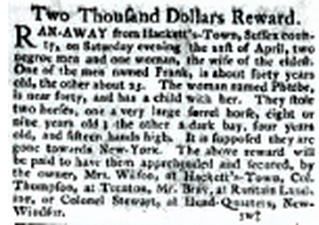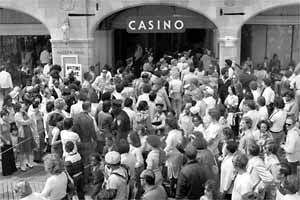* Home
|
On May 1 of 1981
US Senator Harrison A. Williams is convicted by a jury in United States District Court in Brooklyn on nine counts, including bribery, receipt of an unlawful gratuity, conflict of interest, and conspiracy to defraud the United States, after a trial stemming from the FBI 'Abscam' sting in which the FBI produced videotapes of Williams promising to use his influence to aid a supposed Arab sheik (impersonated by an FBI agent) in return for a multi-million dollar loan to a titanium-mining corporation in which the senator had a secret financial interest. Prior to a Senate vote on his expulsion, Williams resigned on March 11, 1982, and served two years of his three-year sentence in a federal prison
On May 2 of 1781
An ad in the New Jersey Gazette posts a $2,000 reward for the return of runaway slaves--two adult men, a woman and a child--who had escaped with two horses in "Hackett's Town". On May 3 of 1923
An estimated 12,000 people attend a Ku Klux Klan rally in Bound Brook. The speakers also held a meeting at the Pillar of Fire Church, a Methodist denomination with ties to the Klan which had its headquarters in nearby Zarephath (a section of present Franklin Township in Somerset County 15 miles north of Princeton). At Zarepath, a crowd of angry protestors surrounded the church to disrupt the meeting. On May 4 of 2020
The US Supreme Court, in Kelly v. United States, unanimously vacates the convictions of Bridget Anne Kelly, Governor Christie's former deputy chief-of-staff, and Bill Baroni, former deputy executive director of the Port Authority. Kelly and Baroni had been sentenced to 18 months and 24 months, respectively, as a result of their convictions in the Bridgegate trial relating to the closing of access lanes to the George Washington Bridge, ostensibly to punish the mayor of Fort Lee for his refusal to support the re-election of Governor Christie. The Court held that since there was no finding that Baroni and Kelly had sought to obtain money or property, they could not have violated the federal-program fraud or wire fraud laws. 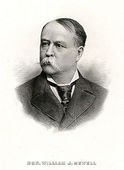
On May 5 of 1864
The Battle of the Wilderness begins in Virginia, with New Jersey forces including the 5th New Jersey regiment of the First Brigade commanded by Colonel William Sewell, who was awarded the Medal of Honor in the prior year for heroism at the Battle of Chancellorsville. After the War, Sewell would be elected as a Republican state senator and later as a US Senator. On May 6 of 1937
The German Zeppelin Hindenburg bursts into flames as it hovers to land at Lakehurst, New Jersey. It is quickly consumed in the fire, with 36 killed, including one ground worker. The cause is never conclusively determined, but is attributed by various analysts to static electricity, lightning or sabotage. On May 7 of 1915 A German U-boat torpedoes and sinks the British-owned steamship Lusitania off the coast of Ireland, killing 1,195 people including 128 Americans. The passengers include Ogden Hammond, a member of the New Jersey General Assembly and his wife, Mary Stevens Hammond, a member of the prominent Stevens family and descendant of famed inventor John Stevens of Hoboken. Mr. Hammond survives the disaster, but his wife Mary is killed. The Hammonds had left their children at home in New Jersey, including their five-year-old daughter Millicent. Millicent would later marry and divorce Hugh Fenwick; under the name of Millicent Hammond Fenwick she would work as an editor at Vogue; be elected to the US House of Representatives, serving from 1973 to 1985, and after appointment by President Reagan, serve from 1983 to 1987 as Ambassador to the United Nations Agencies for Food and Agriculture. She is viewed as a probable inspiration for Garry Trudeau's famous “Doonesbury” cartoon strip pipe-smoking character Lacey Davenport.
On May 9 of 1997
William Reese, a 45-year-old caretaker at the Finn’s Point National Cemetery in Pennsville, was shot dead in the cemetery’s office, with his body found the next day. His red pickup truck was stolen. The murder is later found to have been committed by Andrew Cunanan, who killed four others in other states, including prominent fashion designer Gianni Versace on the steps in front of the Versace home in Miami on July 15.before shooting himself to death a week later while being confronted by police. The shooting in New Jersey is attributed to Cunanan's stealing Reese's truck to aid his escape on his way south where he killed Versace. On May 9 of 1974 The Committee on the Judiciary of the US House of Representatives chaired by New Jersey Democratic Congressman Peter M. Rodino, Jr., begins formal hearings to consider impeachment of President Richard Nixon related to the Watergate burglary and other matters. 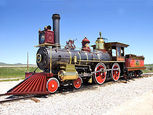
On May 10 of 1869
The First Transcontinental Railroad, linking the eastern and western United States, is completed at Promontory Point, Utah with the driving of a golden spike in the last rail by Leland Stanford, president of the Southern Pacific Railroad. The Union Pacific Locomotive No. 119, one of the two locomotives at the ceremony, was built by the Rogers Locomotive and Machine Works of Paterson. On May 10 of 1883
Lightning strikes a storage tank at Jersey City’s Caven Point oil depot, the world’s largest at the time, starting a fire that created “a blazing sea of oil,” which ultimately killed six workers and caused more than $500,000 worth of damage.
On May 11 of 2024
Former President Donald Trump holds election campaign rally on Wildwood beach, crowd estimated at some 100,000 On May 12 of 1932
The remains of Charles Lindbergh, Jr., the infant son of Charles and Anne Morrow Lindbergh, are found in woods near Hopewell, just a few miles from the Lindbergh home ten weeks after the boy's abduction from his bedroom at the family home, Bruno Richard Hauptmann is later convicted and executed for the crime. |
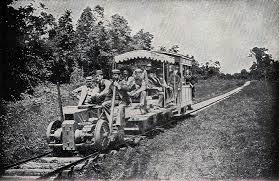
On May 13 of 1880
Thomas Edison demonstrates his electric railway for the first time on a 1/3 mile track at his laboratories in Menlo Park in Middlesex County.
On May 14 of 1844
Delegates to a Constitutional Convention begin meeting in Trenton to draft a new state constitution replacing the initial one adopted in 1776. The new Constitution moderately strengthens the role of the governor, making the office directly elected by the people rather than the legislature; increases the term from one to three years; grants a veto over legislation; and expands the appointment power of judges and other officials.
Delegates to a Constitutional Convention begin meeting in Trenton to draft a new state constitution replacing the initial one adopted in 1776. The new Constitution moderately strengthens the role of the governor, making the office directly elected by the people rather than the legislature; increases the term from one to three years; grants a veto over legislation; and expands the appointment power of judges and other officials.
On May 15 of 1911
US Supreme Court decides case of Standard Oil Co. of New Jersey v. United States in which the Court holds that Standard Oil is an illegal monopoly under the Sherman Antitrust Act. The Court's remedy divides Standard Oil into 34 geographically separate and eventually competing firms.
US Supreme Court decides case of Standard Oil Co. of New Jersey v. United States in which the Court holds that Standard Oil is an illegal monopoly under the Sherman Antitrust Act. The Court's remedy divides Standard Oil into 34 geographically separate and eventually competing firms.
On May 16 of 1916
An explosion at the DuPont Repauno Works, which produces dynamite and TNT in the Gibbstown section of Greenwich Township on the Delaware River, kills 14, injures 30 and destroys two buildings.
An explosion at the DuPont Repauno Works, which produces dynamite and TNT in the Gibbstown section of Greenwich Township on the Delaware River, kills 14, injures 30 and destroys two buildings.
|
On May 17 of 1996
Governor Christine Todd Whitman signs a package of bills collectively known as “Megan’s Law,” requiring registration of convicted sex offenders and notification of their addresses to communities in which they reside. The legislation is initiated following the 1994 murder in Hamilton Township near Trenton of seven-year-old Megan Kanka by a neighbor, a convicted sex offender, who lived across the street from the Kanka family's home. |
|
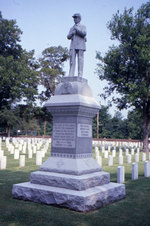
On May 18 of 1905
A granite monument erected by the state of New Jersey is dedicated at the New Bern National Cemetery in North Carolina to the memory of the 9th New Jersey Regiment Volunteer Infantry which fought in the Civil War. The monument features a Union soldier poised on a base on which the names of the battles in which the regiment fought are inscribed.
A granite monument erected by the state of New Jersey is dedicated at the New Bern National Cemetery in North Carolina to the memory of the 9th New Jersey Regiment Volunteer Infantry which fought in the Civil War. The monument features a Union soldier poised on a base on which the names of the battles in which the regiment fought are inscribed.

On May 19 of 1950
Thirty-six workers are killed in South Amboy when ammunition explodes as it is being loaded on a barge for shipment to Pakistan, with another 350 suffering injuries.
Thirty-six workers are killed in South Amboy when ammunition explodes as it is being loaded on a barge for shipment to Pakistan, with another 350 suffering injuries.
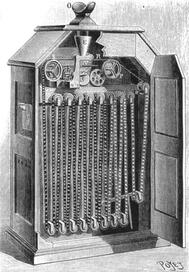
On May 20 of 1891
Thomas Edison gives the first public demonstration of a prototype Kinetoscope at his laboratory in West Orange for approximately 150 members of the National Federation of Women's Clubs. The device allowed a single viewer to look through a peephole into a box in which a moving image was displayed, produced by a strip of perforated film bearing sequential images over a light source with a high-speed shutter.
On May 20 of 1923
109 Klansmen march through the streets of Point Pleasant in hoods and robes as a demonstration “that the Klan is particularly strong in Ocean and Monmouth counties,” reported the Asbury Park Press on the front page of the newspaper the next day.
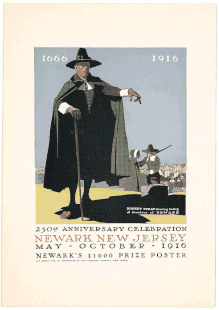
On May 21 of 1666
A group of Puritans from the Connecticut colony led by Captain Robert Treat land on the banks of the Passaic River, later establishing a settlement on the site which would become the City of Newark.
A group of Puritans from the Connecticut colony led by Captain Robert Treat land on the banks of the Passaic River, later establishing a settlement on the site which would become the City of Newark.
On May 22 of 1958
An accidental explosion of several Nike Ajax missiles at their Middletown launch site kills ten Army and civilian ordnance personnel and substantially damages the site.
An accidental explosion of several Nike Ajax missiles at their Middletown launch site kills ten Army and civilian ordnance personnel and substantially damages the site.
|
On May 23 of 2015
Famed mathematician and Nobel Prize recipient John Forbes Nash, Jr., and his wife are killed on the New Jersey Turnpike near Monroe Township when their taxi driver loses control and strikes a guardrail, ejecting the Nashes onto the roadway. They had been on their way home to West Windsor from the airport after a visit to Norway, where Nash had received the Abel Prize in mathematics. Nash's life, and his battles with mental illness, were the subject of the book published in 1998 and Academy Award-winning movie released in 2001 A Beautiful Mind. |
|
On May 24 of 1883
The Brooklyn Bridge first opens for traffic. It was initially designed by German immigrant John Augustus Roebling of Trenton, who died in 1869, shortly after construction began, from an infection caused by an injury at the bridge crushing his toes, with his 32-year-old son Washington Roebling succeeding his father as head of the project. Washington Roebling also suffered a debilitating injury as a result of decompression sickness shortly after ground was broken for the Brooklyn tower foundation in 1870. His wife Emily then took over his on-site supervisory role for the next 11 years until the bridge's opening.
The Brooklyn Bridge first opens for traffic. It was initially designed by German immigrant John Augustus Roebling of Trenton, who died in 1869, shortly after construction began, from an infection caused by an injury at the bridge crushing his toes, with his 32-year-old son Washington Roebling succeeding his father as head of the project. Washington Roebling also suffered a debilitating injury as a result of decompression sickness shortly after ground was broken for the Brooklyn tower foundation in 1870. His wife Emily then took over his on-site supervisory role for the next 11 years until the bridge's opening.
On May 25 of 1787
The Constitutional Convention begins meeting in Philadelphia. Delegates from New Jersey are David Brearly, former New Jersey chief justice and a colonel in the state militia during the Revolutionary War; Jonathan Dayton, member of state Assembly and later US congressman and senator; William Houston, former member of Continental Congress and professor of mathematics and natural philosophy at the College of New Jersey; William Livingston, governor from 1776 to death in 1790; and William Paterson, former state attorney general and later US senator, governor and associate justice of US Supreme Court. 'The Great Compromise' reached during the deliberations included elements of the 'New Jersey Plan' put forth by William Paterson that provided a dual system of congressional representation in which each state in the House of Representatives would be assigned a number of seats in proportion to its population but In the Senate all states would have the same number of seats.
The Constitutional Convention begins meeting in Philadelphia. Delegates from New Jersey are David Brearly, former New Jersey chief justice and a colonel in the state militia during the Revolutionary War; Jonathan Dayton, member of state Assembly and later US congressman and senator; William Houston, former member of Continental Congress and professor of mathematics and natural philosophy at the College of New Jersey; William Livingston, governor from 1776 to death in 1790; and William Paterson, former state attorney general and later US senator, governor and associate justice of US Supreme Court. 'The Great Compromise' reached during the deliberations included elements of the 'New Jersey Plan' put forth by William Paterson that provided a dual system of congressional representation in which each state in the House of Representatives would be assigned a number of seats in proportion to its population but In the Senate all states would have the same number of seats.
On May 26 of 1998
The US Supreme Court rules in the case of New Jersey v. New York 523 U.S. 767 (1998) that New Jersey had jurisdiction over all portions of Ellis island created by landfill after the original compact between the two states in 1834 was approved, over 80% of the island's present land.
The US Supreme Court rules in the case of New Jersey v. New York 523 U.S. 767 (1998) that New Jersey had jurisdiction over all portions of Ellis island created by landfill after the original compact between the two states in 1834 was approved, over 80% of the island's present land.
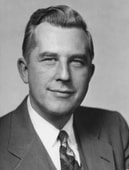
On May 27 of 1990
Robert Baumle Meyner, a Democrat who served two terms as the 44th governor of New Jersey from 1954 to 1962, dies at the age of 81. Meyner was known as a fiscal conservative who supported expanded state support for education. He became a candidate for president in the 1960 election, receiving 43 votes at the Democratic National Convention, but angered several New Jersey delegates by refusing to withdraw as a candidate to allow them to vote for John F. Kennedy, the eventual nominee on the first ballot. In 1969, he again was the Democratic nominee for governor, losing to Republican William Cahill.
Robert Baumle Meyner, a Democrat who served two terms as the 44th governor of New Jersey from 1954 to 1962, dies at the age of 81. Meyner was known as a fiscal conservative who supported expanded state support for education. He became a candidate for president in the 1960 election, receiving 43 votes at the Democratic National Convention, but angered several New Jersey delegates by refusing to withdraw as a candidate to allow them to vote for John F. Kennedy, the eventual nominee on the first ballot. In 1969, he again was the Democratic nominee for governor, losing to Republican William Cahill.
On May 27 of 1982
John McMullen, one of three partners who had purchased the National Hockey League franchise of the Colorado Rockies, announces that the Rockies would move to East Rutherford and play at Brendan Byrne Arena in the Meadowlands (which opened the previous year), as the NHL's Board of Governors had approved the relocation. After requesting public suggestions on a new name for the team, the Rockies are re-named as the New Jersey Devils after a mythical creature once thought to have inhabited the forests of the Pinelands.
John McMullen, one of three partners who had purchased the National Hockey League franchise of the Colorado Rockies, announces that the Rockies would move to East Rutherford and play at Brendan Byrne Arena in the Meadowlands (which opened the previous year), as the NHL's Board of Governors had approved the relocation. After requesting public suggestions on a new name for the team, the Rockies are re-named as the New Jersey Devils after a mythical creature once thought to have inhabited the forests of the Pinelands.
On May 28 of 1898
One worker is killed and two injured in an explosion in a mixing mill at the smokeless powder works of the Dupont Company at Carney's Point on the Delaware River. The explosion is caused by a pebble in the mixing trough which ignited a fire that destroyed three mills. Francis G. Dupont, Alexis Dupont, and Pierre Dupont supervised efforts to put out the fire including, at the risk of their lives, entering a burning storehouse to remove 200 pounds of gun cotton to a place of safety.
One worker is killed and two injured in an explosion in a mixing mill at the smokeless powder works of the Dupont Company at Carney's Point on the Delaware River. The explosion is caused by a pebble in the mixing trough which ignited a fire that destroyed three mills. Francis G. Dupont, Alexis Dupont, and Pierre Dupont supervised efforts to put out the fire including, at the risk of their lives, entering a burning storehouse to remove 200 pounds of gun cotton to a place of safety.
On May 29 of 2004
Archibald Cox, Jr., the Special Prosecutor in the Watergate investigation who was fired by President Nixon on October 21, 1973, in what became known as the "Saturday Night Massacre," dies at the age of 92. Cox was born in Plainfield on May 17, 1912.
Archibald Cox, Jr., the Special Prosecutor in the Watergate investigation who was fired by President Nixon on October 21, 1973, in what became known as the "Saturday Night Massacre," dies at the age of 92. Cox was born in Plainfield on May 17, 1912.
On May 30 of 1924
A crowd estimated at 20,000 attends the dedication of a 66-foot high granite obelisk, modeled after the Washington Monument, commemorating the one million soldiers who passed through Camp Merritt in Bergen County on their way to fight in Europe during World War I. General John J. "Cactus Jack" Pershing gives the featured address at the dedication of the monument, which is located on the border of Cresskill and Dumont.
A crowd estimated at 20,000 attends the dedication of a 66-foot high granite obelisk, modeled after the Washington Monument, commemorating the one million soldiers who passed through Camp Merritt in Bergen County on their way to fight in Europe during World War I. General John J. "Cactus Jack" Pershing gives the featured address at the dedication of the monument, which is located on the border of Cresskill and Dumont.
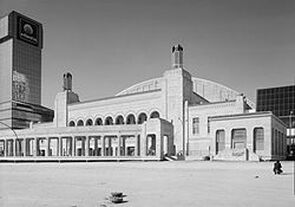
On May 31 of 1929
Atlantic City's Convention Hall is dedicated. It served as the home of the Miss America pageant from 1929 until 2004 and in 1964 was the site of the Democratic National Convention which nominated Lyndon B. Johnson for president and Hubert H. Humphrey for vice president.
Atlantic City's Convention Hall is dedicated. It served as the home of the Miss America pageant from 1929 until 2004 and in 1964 was the site of the Democratic National Convention which nominated Lyndon B. Johnson for president and Hubert H. Humphrey for vice president.
On May 31 of 1995
Upsala College closes after its enrollment had declined to 435 students, less than a third of its prior levels. Founded in 1893 in Brooklyn and later relocated to Kenilworth and finally to East Orange in 1924, the College was established as part of the Augustana Synod—a Lutheran church body with roots in Sweden, but it suffered with increasing crime surrounding its campus in East Orange and competition with other higher educational institutions.
Upsala College closes after its enrollment had declined to 435 students, less than a third of its prior levels. Founded in 1893 in Brooklyn and later relocated to Kenilworth and finally to East Orange in 1924, the College was established as part of the Augustana Synod—a Lutheran church body with roots in Sweden, but it suffered with increasing crime surrounding its campus in East Orange and competition with other higher educational institutions.

